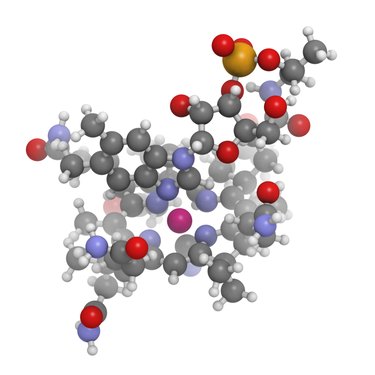Vitamin D Deficiency And Vomiting

Vitamin B12 molecule
Image Credit: Molekuul/iStock/Getty Images
Nausea is a symptom telling you that something is not quite right with your body. You might associate nausea only with eating spoiled food, catching the flu or the early months of pregnancy, but many other factors and conditions can lead to nausea. Vitamin deficiencies are not often associated with most symptoms experienced by people living in developed and modernized countries because it is assumed that we are all well-nourished, but they are not uncommon in the United States and might contribute to more symptoms than currently assumed by mainstream medicine. For example, low levels of vitamins D or B-12 might cause nausea in some people.
Nausea
Nausea is a vague feeling of sickness or queasiness leading to sensations of unease and discomfort in the stomach. Nausea often leads to an involuntary urge to vomit, but not always. According to "Harrison's Principles of Internal Medicine," motion sickness is a common cause of nausea, but organic causes include stomach infections, food poisoning, toxicity from medications, pregnancy, overexertion, stress, grief and depression. Deficiencies in nutrients such as vitamins are rarely associated with nausea in medical texts, although it is recognized that at least 10 percent of cases are of unknown etiology. Medications classified as antiemetics often are recommended to reduce the sensation of nausea.
Vitamin D
Vitamin D acts more like a hormone than it does a typical vitamin. One of the main roles of vitamin D is to help your body regulate calcium and phosphorus levels. As such, it is important for strong bones and teeth, muscle tone and mood. If you do not have enough vitamin D, normal calcium intestinal absorption is reduced and your body must liberate calcium from your bones to your bloodstream to maintain functional biochemistry, which eventually leads to the bone diseases osteoporosis and osteomalacia. However, too much calcium in the blood, which is called hypercalcemia, can lead to nausea, according to the book "Human Biochemistry." Further, commonly acknowledged primary symptoms of vitamin D deficiency include muscle and joint pain, fatigue, depression, sleep disturbance and intestinal disorders. Any one of these primary symptoms could lead to sensations of nausea in sensitive individuals.
Vitamin B-12
Vitamin B-12 is involved in many functions in your body, such as metabolism, red blood cell production, nerve transmission and short-term memory. Numbness and tingling in the limbs, anemia, depression and symptoms very similar to Alzheimer's disease are well-recognized long-term symptoms of B-12 deficiency, although common early symptoms that are readily noticed include fatigue, poor digestion, loss of appetite and nausea.
Causes of Low Levels
The most common cause of inadequate levels of vitamin D is a lack of appropriate exposure to sunshine. Many people avoid sun exposure due to fear of skin cancer, wrinkles and sun spots, but vitamin D-3 is made in copious amounts when your skin is exposed to certain frequencies of sunlight. These frequencies are most prevalent during summer. Vitamin D deficiency is most common in northern climates because of a lack of high UV radiation from the sun, according to "Public Health Nutrition: From Principles to Practice."
Vitamin B-12 deficiency often is caused by either inadequate dietary intake or poor absorption due to loss of intrinsic factor or lack of stomach acid. Intrinsic factor is needed to absorb B-12 in your stomach, and its production often reduces with aging. Good sources of B-12 include organ meats, fish, nutritional yeast and some legumes and leafy vegetables.
Vitamin D Deficiency And Vomiting
Source: https://www.livestrong.com/article/547745-nausea-and-low-vitamin-d-vitamin-b-12/


0 Komentar